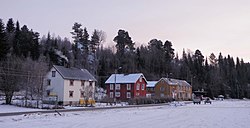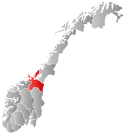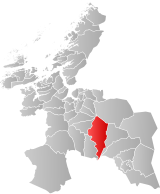Singsås Municipality
Singsås Municipality
Singsås herred | |
|---|---|
| Singsaas herred (historic name) | |
 View of the village of Singsås | |
 Sør-Trøndelag within Norway | |
 Singsås within Sør-Trøndelag | |
| Coordinates: 62°57′22″N 10°43′51″E / 62.9562°N 10.7308°E | |
| Country | Norway |
| County | Sør-Trøndelag |
| District | Gauldalen |
| Established | 1841 |
| • Preceded by | Holtaalen Municipality |
| Disestablished | 1 Jan 1964 |
| • Succeeded by | Midtre Gauldal Municipality |
| Administrative centre | Singsås |
| Area (upon dissolution) | |
• Total | 767 km2 (296 sq mi) |
| Population (1964) | |
• Total | 1,554 |
| • Density | 2.0/km2 (5.2/sq mi) |
| Demonym | Singsåsbygg[1] |
| Time zone | UTC+01:00 (CET) |
| • Summer (DST) | UTC+02:00 (CEST) |
| ISO 3166 code | NO-1646[2] |
Singsås is a former municipality in the old Sør-Trøndelag county, Norway. The 767-square-kilometre (296 sq mi) municipality existed from 1841 until its dissolution in 1964. Singsås municipality encompassed the eastern part of what is now the municipality of Midtre Gauldal in Trøndelag county. The administrative center was the village of Singsås, where the Singsås Church is located.[3]
History
[edit]In 1841, the western district (population: 1,272) of the old municipality of Holtaalen was split off to form a separate municipality called Singsaas (under the recently passed formannskapsdistrikt law). On 1 January 1875, an unpopulated area of Singsås municipality made up of rural farmland and mountains was transferred to the neighboring municipality of Budal. During the 1960s, there were many municipal mergers across Norway due to the work of the Schei Committee. On 1 January 1964, the municipalities of Budal (population: 529), Singsås (population: 1,554), Soknedal (population: 1,916), and Støren (population: 2,296) were all merged to form the new municipality of Midtre Gauldal.[4]
Name
[edit]The municipality (originally the parish) is named after the old Singsås farm (Old Norse: Singillsaas) since the first Singsås Church was built there. The first element is a male name Singull or Singulfr. The last element is possibly áss which means "hill" or "ridge".[3][5] On 21 December 1917, a royal resolution enacted the 1917 Norwegian language reforms. Prior to this change, the name was spelled Singsaas with the digraph "aa", and after this reform, the name was spelled Singsås, using the letter å instead.[6][7]
Government
[edit]While it existed, this municipality was responsible for primary education (through 10th grade), outpatient health services, senior citizen services, unemployment, social services, zoning, economic development, and municipal roads. During its existence, this municipality was governed by a municipal council of elected representatives, which in turn elected a mayor.[8]
Municipal council
[edit]The municipal council (Herredsstyre) of Singsås was made up of representatives that were elected to four year terms. The party breakdown of the final municipal council was as follows:
| Party name (in Norwegian) | Number of representatives | |
|---|---|---|
| Labour Party (Arbeiderpartiet) | 8 | |
| Christian Democratic Party (Kristelig Folkeparti) | 2 | |
| Centre Party (Senterpartiet) | 5 | |
| Liberal Party (Venstre) | 2 | |
| Total number of members: | 17 | |
| Party name (in Norwegian) | Number of representatives | |
|---|---|---|
| Labour Party (Arbeiderpartiet) | 8 | |
| Joint List(s) of Non-Socialist Parties (Borgerlige Felleslister) | 9 | |
| Total number of members: | 17 | |
| Party name (in Norwegian) | Number of representatives | |
|---|---|---|
| Labour Party (Arbeiderpartiet) | 8 | |
| Joint List(s) of Non-Socialist Parties (Borgerlige Felleslister) | 8 | |
| Total number of members: | 16 | |
| Party name (in Norwegian) | Number of representatives | |
|---|---|---|
| Labour Party (Arbeiderpartiet) | 8 | |
| Joint List(s) of Non-Socialist Parties (Borgerlige Felleslister) | 8 | |
| Total number of members: | 16 | |
| Party name (in Norwegian) | Number of representatives | |
|---|---|---|
| Labour Party (Arbeiderpartiet) | 8 | |
| Joint List(s) of Non-Socialist Parties (Borgerlige Felleslister) | 8 | |
| Total number of members: | 16 | |
| Party name (in Norwegian) | Number of representatives | |
|---|---|---|
| Labour Party (Arbeiderpartiet) | 8 | |
| Joint List(s) of Non-Socialist Parties (Borgerlige Felleslister) | 8 | |
| Total number of members: | 16 | |
| Note: Due to the German occupation of Norway during World War II, no elections were held for new municipal councils until after the war ended in 1945. | ||
Mayors
[edit]- 1841–1841: Peder Olsen Reppe
- 1842–1845: Peder Thomassen Talsnes
- 1846–1849: Esten Andersen Hovstad
- 1850–1851: Hans Jacobsen Winsnes
- 1852–1855: Ole Pedersen Kjelden
- 1856–1859: Peder Pedersen Winsnes
- 1860–1861: Hans Jacobsen Winsnes
- 1862–1865: Peder Pedersen Winsnes
- 1866–1867: Peder Tønder Monsen
- 1868–1879: Peder Pedersen Winsnes
- 1880–1898: Hans Olsen Mahlum (H)
- 1899–1901: Tomas Jensen Bogen (V)
- 1902–1904: Peder Pedersen Reppe (V)
- 1905–1916: Ingebrigt Ingebrigtsen Huus (V)
- 1917–1919: Tomas Jensen Bogen (V)
- 1920–1922: Ole Olsen Koth (Ap)
- 1923–1928: Ole Hansen Malum (H)
- 1929–1934: Hans Pedersen Winsnes (Bp)
- 1935–1937: Ingebrigt Ingebrigtsen Huus (Bp)
- 1938–1941: Hans P. Foros (Ap)
- 1941–1943: Arnt P. Hinsværk
- 1943–1945: Johan P. Kristiansen
- 1945–1947: Hans P. Foros (Ap)
- 1948–1959: Arnt P. Hinsværk (Bp)
- 1960–1963: Ivar Grytdal (Bp)
See also
[edit]References
[edit]- ^ "Navn på steder og personer: Innbyggjarnamn" (in Norwegian). Språkrådet.
- ^ Bolstad, Erik; Thorsnæs, Geir, eds. (26 January 2023). "Kommunenummer". Store norske leksikon (in Norwegian). Kunnskapsforlaget.
- ^ a b Rosvold, Knut, ed. (29 August 2017). "Singsås – tidligere kommune". Store norske leksikon (in Norwegian). Kunnskapsforlaget. Retrieved 21 January 2018.
- ^ Jukvam, Dag (1999). Historisk oversikt over endringer i kommune- og fylkesinndelingen (PDF) (in Norwegian). Statistisk sentralbyrå. ISBN 9788253746845.
- ^ Rygh, Oluf (1901). Norske gaardnavne: Søndre Trondhjems amt (in Norwegian) (14 ed.). Kristiania, Norge: W. C. Fabritius & sønners bogtrikkeri. p. 228.
- ^ "Norsk Lovtidende. 2den Afdeling. 1917. Samling af Love, Resolutioner m.m". Norsk Lovtidend (in Norwegian). Oslo, Norway: Grøndahl og Søns Boktrykkeri: 1000. 1917.
- ^ Den Nye rettskrivning : regler og ordlister (in Norwegian). Kristiania, Norge: Den Mallingske Boktrykkeri. 1918.
- ^ Hansen, Tore; Vabo, Signy Irene, eds. (20 September 2022). "kommunestyre". Store norske leksikon (in Norwegian). Kunnskapsforlaget. Retrieved 1 January 2023.
- ^ "Kommunevalgene og Ordførervalgene 1959" (PDF) (in Norwegian). Oslo: Statistisk sentralbyrå. 1960. Retrieved 20 April 2020.
- ^ "Kommunevalgene og Ordførervalgene 1955" (PDF) (in Norwegian). Oslo: Statistisk sentralbyrå. 1957. Retrieved 20 April 2020.
- ^ "Kommunevalgene og Ordførervalgene 1951" (PDF) (in Norwegian). Oslo: Statistisk sentralbyrå. 1952. Retrieved 20 April 2020.
- ^ "Kommunevalgene og Ordførervalgene 1947" (PDF) (in Norwegian). Oslo: Statistisk sentralbyrå. 1948. Retrieved 20 April 2020.
- ^ "Kommunevalgene og Ordførervalgene 1945" (PDF) (in Norwegian). Oslo: Statistisk sentralbyrå. 1947. Retrieved 20 April 2020.
- ^ "Kommunevalgene og Ordførervalgene 1937" (PDF) (in Norwegian). Oslo: Statistisk sentralbyrå. 1938. Retrieved 20 April 2020.
- ^ Lodgaard, Christian (1966). "Fra ætt- og grendesamfunn til kommune". Singsåsboka (in Norwegian). Vol. 1–1. Singsås bygdeboknemnd. pp. 141–148.

